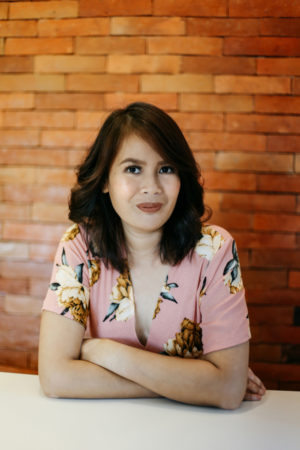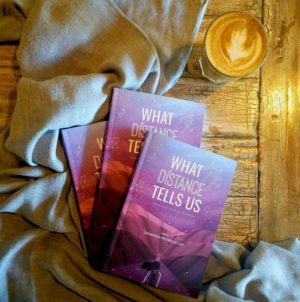WOULD you barter the very roof above your head for the bauble of your dreams?
A writer did exactly that in an exchange now deeply embedded in the lore of travel literature in the country.
Even in a mobile kind of residence, she still has conjured a riotous landscape for all of us—more than six acres as witty, thoughtful, and unexpected as she is.
“I never had an idea of a physical home,” says Johanna Michelle Lim, 30, author of “What Distance Tells Us: Travel Essays about the Philippines” launched last Feb. 23, Friday, at Qube Gallery in Crossroads, Banilad.
In her first book, she divides it in four chapters, representing the four compass points.
Up north are Mountain Province, Benguet, and Batanes while the west covers Iloilo, Palawan, and Islas de Guimaras. South includes Zamboanga, South Cotabato, and Tawi-Tawi.
In the east, the tides of Siargao ebb and flow like kings of the pacific. Distribution of the book is through its official Facebook page.
It will be sold at Urban Lifestyle in Vibo’s Place on Escario Street and at the souvenir shop of Casa Gorordo Museum in Pari-an.
“This distance is more difficult to trace. It is the interval between two points in time—the route from where I started this very act of estrangement, to my here and now,” pens Lim, a graduate of Bachelor of Fine Arts in Advertising Arts at the University of San Carlos.
Okay, sure.
Sixty-three hours of sweat equity later—pardon us for asking—can travel really change our God-given shape, too?
For her, traveling is not a slave of motion. It is how, kilometer after kilometer, her ear is always there to lend. How, even on her way up, she never put anyone down.
This isn’t just traveling.
It is where she stores her superpowers.
What does distance tell us then?
Great love and great lovers at hand—thank you very much.
Do we become better lovers if we travel?
I like the idea that love is the meeting of two solitudes, protecting each other.
It has helped me understand that we all have different definitions of love.
My partner now, the dad of my daughter, we broke up five years ago because at that time, before I started traveling, I had so many preconceived notions of how a relationship should be, how money should be handled: this is how you should show love. I had so many frustrations.
Three years down the line, travel has really helped me realized that expectation is the decrement of it all.
Because if we don’t expect, we open ourselves to the beauty of the world. So yes, I have become a better lover (laughs).
So your future husband should be as intellectual, too?
I used to think that way (laughs).
But my partner now is very outdoorsy.
He’s very extroverted.
He likes the idea of a sense of community, having a social norm, having a social group.
My partner is Filipino, but I used to date an Italian. I realized he was not any different.
You do not think of the nationality, but the person. It’s the humanity that you look up instead.
What made you decide to write travel essays?
I was a child of two homes, Negros and Cebu.
When I was a child, back and forth ra gyud mi so I never felt it.
I never had an idea of a physical home.
I was more comfortable with the “in between” ba.
I don’t know if it’s a generational thing, but the millennial is always so restless.
It always connotes something negative to a lot of people.
But to me, it’s okay to harness that restlessness and transform it into something beneficial.
First, I tried to really listen to the intention.
My passion is into stories, but I couldn’t learn from it lang.
I’m a firm believer of a Japanese concept of “ikigai” where you transform, merge your passion, mission, and advocacy—you’re core ba.
Why do we have to travel?
Every person has a different why.
But I think it’s important to know your why when you travel because otherwise, you just get distracted with sensation of the movement, the novelty of it all, the people you meet.
That is the importance of the layers of it.
Yes, you went out, but did you bring something home? It’s really important to bring something home.
I don’t advocate the perspective of the millennial when they say that travel is the new association of affluence.
What does distance really tell us?
I think distance leads us to the idea of detaching from yourself which distance brings you.
Like you feel ba that you already have preconceived notions about yourself, about your identity, your conditions, social structure, all these things.
When you travel, everything turns upside down.
Geographical condition is different.
It forces you to act different unknowingly ba.
So I think the idea of distance is detaching from a preconceived that you set or fate has set for you.
So much of the world is changing, and people are afraid of change.
So it’s wise to know that so much of a good conflict is to know you’re used to a certain understanding of the world.
But when you get used to the idea of detaching of yourself, then you can better understand that it’s okay to change your mind about a certain topic or issue of the world.
What’s your most favorite chapter?
I can’t pick which one exactly.
I feel mas klaro akong voice sa mga more personal essays because in the span of 10 years, mo-change baya imong tingog.
I think ma notice siguro na sa mga tao.
You know, when they read it collectively.
My favorites are the ones nga dili nako formed as a person kay I think I really have something to say—the one in Palawan when I talked about my mom and my daughter. I like the surfing part.
What did you bring home after the long travel?
I think the idea that everyone has a story.
Recently, I was asked by some writers na to sign the Rappler issue.
Then I realized, it’s not really my role as a writer.
I like the idea of writing being a medium of understanding rather than divisiveness.
I do not like polarities because in every story, there’s a gray area.
There’s always a nuance to all our stories. That is why I am fascinated with people and places.
Most of the places in the book are all tourist places, so in essence, there’s nothing new other than the insights that you get and the people you meet. I think in that regard, the people that you meet are all flawed.
They’re all striving to have a better life. They all want the best for themselves and their loved ones.
I like writing as a unifier.
I was advised by my editor to take the mundane things so they become less ordinary.
Share to us an unforgettable experience while writing this book.
Sa Tawi-Tawi gyud, I did not write this in the book, nag interview ko og drug addict. S
AF siya, the captain, nahubog na.
And then I realized, sometimes diay no how humans work, kay hubog naman ang captain, he was using me as a interrogating instrument ba because he was trying to get the source sa drugs sa Tawi-Tawi.
Nikuha na siya sa iyang pusil and unsay naka nice?
The drug addict really comforted me: “Okey ra na ma’am, dapat kang ma-anad.”
Pero black hole baya kaayo to kay it was in their camp, so wala’y cellphone, you can’t come back anymore.
Literally, they said, a lot of people have been buried there.
I realized you can’t really put people in a box kay mas na comforted ko sa drug addict.
That is not so nice about travel.
You come in with a pre-conception, baggage from your own milieu.
What Pico Iyer said, you travel to lose yourself and in the process, you find yourself.
Believe in the goodness of the people.
Do you feel like being stripped naked in public?
All the time.
That is the risk you take when you write essays.
Kailangan man gyud siya that you put in a personal voice.
Not necessarily something confessional, but something true to your personal truths.
Ironically, that’s what pushed me to write travel essays.
It’s what Cristina Pantoja-Hidalgo, the first travel writer in the Philippines, said that she gravitated towards travel writing because it allowed her not to be too personal.
You make it as an excuse—that external stimuli. But I think, along that process, you can’t help but delve into yourself because what other subject do you know intimately?
Ikaw ra gyud.
It’s not natural to me, though, because I like the idea of solitude.
What ignites your medium?
I was uncomfortable with the idea—to some extent—that I have all these privileges and I was so comfortable of my life, and I realized this is not how the rest of our society works.
I felt inadequate in the sense that I am trying to understand them.
When you go into social development, the first year ana, oo malooy ka, you want to help.
Second is, how do you deepen your understanding? It’s not just giving, but it’s about cultural reform.
Tell us about your “ikigai.”
Writing is my passion. I am into advertising, so I know how to sell my ideas.
I was restless.
How do I do that? My mission is to empower people who are on sides, who think they are ordinary.
For me, there’s always something spectacular in the ordinary.
In terms of social development, I ask about core.
Unsa man gyud ng core?
I was so sheltered, so fascinating kaayo nako nga matulog sa balay sa mangingisda, matulog ko sa merkado.
How far have we gone in terms of social development?
We are very misunderstood.
Education is very important.
But we are very “textbook” in terms of understanding, and there’s so much divisiveness nowadays and politics.
You don’t need to look at the statistics.
You have to look at your neighbors, or the kids of your house help.



